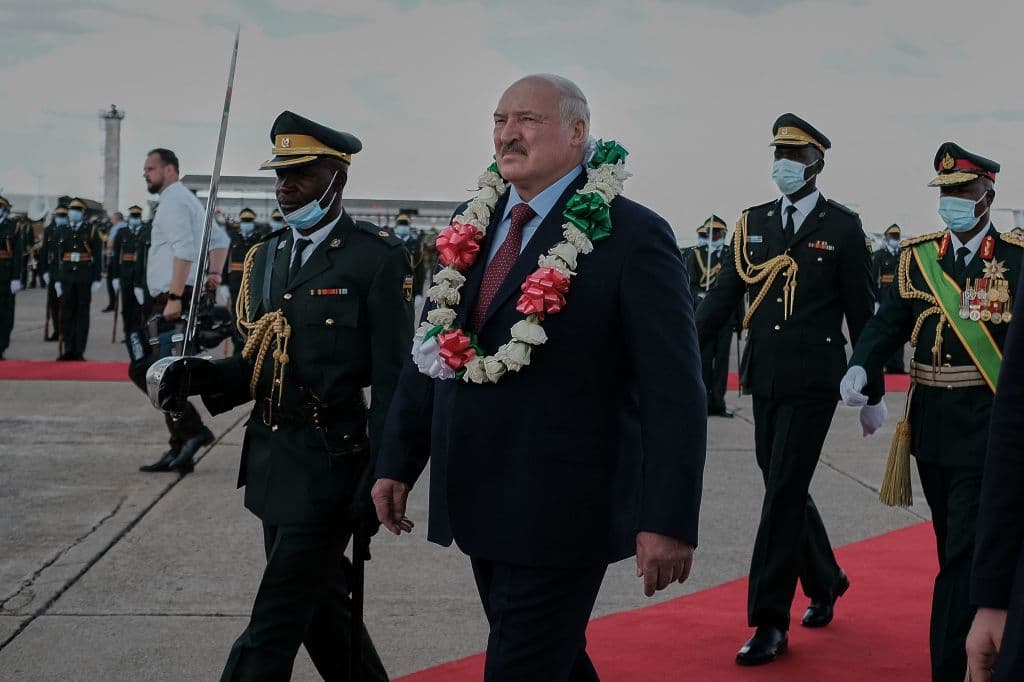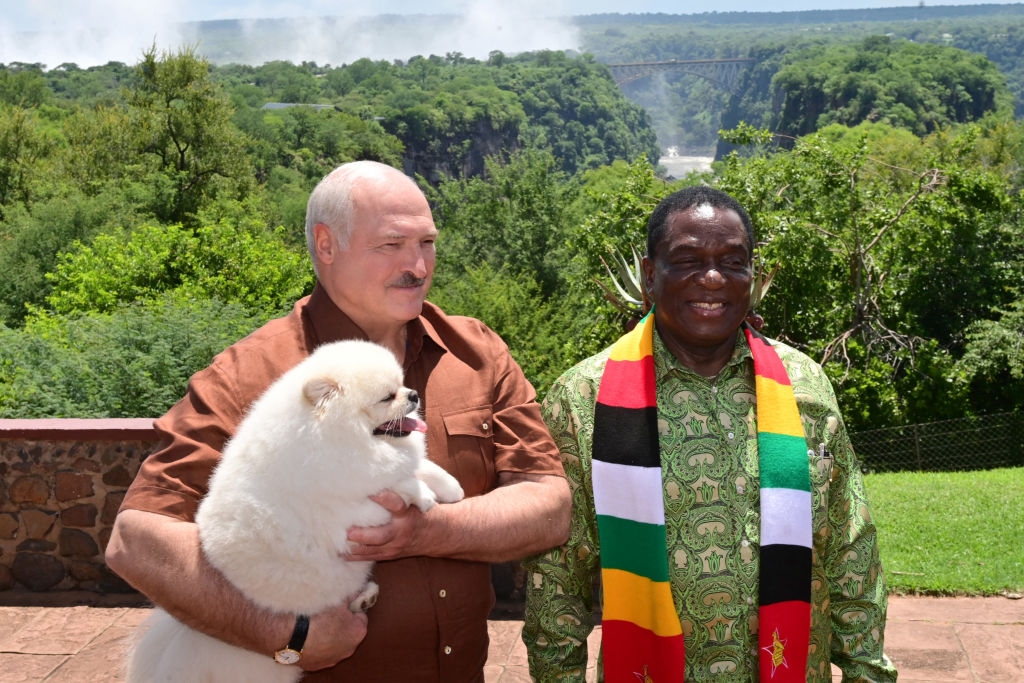Belarus Weekly: EU proposes additional sanctions on Belarus, Lukashenko travels to distant ally Zimbabwe

In response to Belarus' year-long support of Russia's full-scale war against Ukraine, the European Union is preparing a fresh round of sanctions against Minsk.
The new restrictions will align with those imposed on Moscow, helping to block the circumvention of sanctions through Belarus.
One of Russia's military divisions completes training in Belarus as it prepares to be deployed to Ukraine.
Despite widespread resistance, the International Olympic Committee plans to allow Russian and Belarusian athletes to participate in the upcoming Olympics under a neutral flag.
Belarus assumes autonomous control of Russian-supplied Iskander missile systems after finishing training.
Belarus introduces a system to control every domestic business with foreign capital.
On a rare and odd visit to Zimbabwe, Belarusian dictator Alexander Lukashenko reiterates his support for Russia.
Belarusian authorities place the co-owner of a major Belarusian game development company on Belarus' "terrorist list" and sentence a man to jail for taking photos of a Russian-controlled airfield.
EU proposes additional sanctions on Belarus
The European Union (EU) has proposed additional sanctions on Belarus for its support of Russia’s full-scale war against Ukraine, according to documents seen by Bloomberg.
The sanctions will reportedly target Belarus’s energy, aviation, and tech sectors, placing export bans on dual-use goods and technologies used for military purposes or could bolster the country’s industrial capacity.
Sanctions will also reportedly be placed on oil, coal, steel products, gold, luxury goods, investments, and the provision of certain services. However, the proposed sanctions will exempt medication, agricultural, and food products and allow related financial transactions involving sanctioned individuals.
According to Reuters, EU ambassadors said the proposal is intended to align sanctions on Belarus with those on Russia, reducing the ability to circumvent sanctions placed on Russia by going through Belarus.
The EU official said an agreement will likely be reached next week. To be approved, the proposal will need the support of all EU member states.
Sanctions have already been imposed on Belarus for its role as a co-belligerent in Russia’s war, including on potash, mineral fuels, wood, steel, rubber, and tobacco products. Restrictions have also been placed on Belarus’ financial sector.
UK intelligence: Russian military division completes training in Belarus
“Russia has likely completed training of the 2nd Guard Motor Rifle Division (GMRD) in Belarus,” the U.K. Defense Ministry said in its Jan. 26 report.
The division has carried out training in Belarus since late 2022.
Most of the division has reportedly returned to Russia, before likely being sent to participate in Russia’s full-scale war against Ukraine.
According to the ministry, there is a “realistic possibility” that other Russian units will be sent to Belarus for similar training.
The 2nd GMRD, part of the 1st Guards Tank Army, endured significant losses at the start of Russia’s full-scale war. The ministry noted that it is mainly comprised of mobilized personnel and older equipment, thus likely limiting its combat effectiveness despite training.
Monitoring group Belarusian Hajun said it observed the rotation of Russian troops stationed in Belarus in mid-January. Around 1,000 Russian soldiers were sent back to Russia.
There are currently 5,800 Russian military personnel in Belarus, according to the Ukrainian Defense Ministry’s Main Intelligence Directorate.
The week prior, Ukraine’s State Border Guard Service reported around 11,000. The number is constantly changing due to the ongoing rotation of personnel.
Ukraine’s military has repeatedly said an offensive from Belarusian territory remains unlikely.
IOC plans to allow Russian, Belarusian athletes to participate in Olympic Games
The International Olympic Committee (IOC) said on Jan. 25 that it plans to allow Russian and Belarusian athletes to participate in the 2024 Summer Olympics in Paris under a neutral flag, despite President Volodymyr Zelensky's plea to exclude them entirely.
The IOC said it will prolong its sanctions against Russia and Belarus, which include a ban on national symbols and the invitation of government officials, but will not prevent athletes from participating "just because of their passport."
The board also "welcomed and appreciated the offer" from the Olympic Council of Asia to allow Russians and Belarusians to participate in its competitions so they could qualify for the 2024 Olympics.
The IOC recommended barring Russian and Belarusian athletes from competitions on Feb. 28, after Russia, with the support of Belarus, launched its full-scale invasion of Ukraine on Feb. 24, 2022.
"I particularly emphasized that athletes from Russia should have no place at the Olympic Games in Paris," Zelensky said after his call with French President Emmanuel Macron on Jan. 24.
Ukraine's Sports Minister Vadym Gutzeit said that Ukraine could boycott the Olympics if the IOC's plan advances.
U.K. Culture Secretary Michelle Donelan said the IOC's decision is "a world away from the reality of war being felt by the Ukrainian people." Similarly, Estonian Prime Minister Kaja Kallas called the suggestion to lift the ban "politically and morally wrong."
President of the Latvian Olympic Committee Zorzs Tikmers said on Jan. 30 that Latvia won't participate in the Olympic Games alongside athletes from Russia and Belarus while Russia's war against Ukraine continues, Delfi media outlet reported.
Belarus assumes control of Iskander missile systems
Belarus' Defense Ministry announced on Feb. 1 that it has assumed the "full independent operation" of Russian-supplied Iskander missile systems after finishing training in Russia and Belarus.
Ruslan Chekhov, the commander of Belarus' rocket and artillery forces, claimed that Belarus did not previously have a strike weapon with a range of over 300 kilometers.
The nuclear-capable missiles have a range of up to 500 kilometers.
In late December, Russia's Foreign Ministry claimed that "there are no plans to physically equip Belarusian systems with nuclear warheads, nor to move such warheads to Belarusian territory."
Lukashenko said on Dec. 19 that Russia had transferred and deployed S-400 missile systems and Iskander short-range ballistic missile systems to Belarus.
Belarus introduces mechanism to establish control over domestic companies with foreign capital
The Belarusian government introduced a law on Jan. 27 that allows Minsk to seize virtually any business with foreign capital.
The new set of regulations suggests Minsk can appoint a state-approved manager to any company with foreign investors if the company's owners don't participate in the company's activities or their actions can cause so-called "damage."
On Jan. 28, the Belarusian government also amended the list of companies with foreign investors from so-called "hostile" countries. Those investors are banned from selling their stakes.
The list was expanded from 190 to 1849 businesses.
The legislation to ban foreign investors from selling their shares in Belarus was introduced in July 2022 and featured 190 enterprises, including major Belarusian retail and tech companies, manufacturers, and developers.
The updated decree expands the list almost tenfold. Experts suggest that the measure was designed to stop the outflow of capital from the country.

Belarusian dictator Alexander Lukashenko (L) and President of Zimbabwe Emmerson Mnangagwa visit Victoria Falls on the Zambezi River, on the border with Zambia, on Feb. 1, 2023. (ANDREI STASEVICH/BELTA/AFP via Getty Images)
Lukashenko: Belarus is always ready to support Russia
On a state visit to Zimbabwe on Jan. 31, Lukashenko reiterated his support for Russia, saying he is willing to offer more assistance but that it does not need "any help" at the moment.
Domestically presented as a "diplomatic breakthrough," Lukashenko's visit to Zimbabwe was intended to bolster the countries' joint economic programs – specifically, the Zimbabwe-Belarus agricultural mechanization program worth around $66 million.
Zimbabwe and Belarus are under sanctions imposed for human rights violations.
Commenting on the countries' similarities, Lukashenko claimed the West "won't let Zimbabwe be in peace" due to the abundance of its natural resources.
According to the Pandora Papers, the Belarusian government's top leadership benefited from the Zimbabwe mining business.
KGB puts co-owner of major Belarusian game dev company on 'terrorist' list
Belarusian KGB added Mikalai Katsalapau, the co-owner of major Belarusian video game company Wargaming Group, to its list of persons allegedly involved in "terrorist activities."
He is accused of financing terrorist activities.
Katsalapau holds the position of Director of Business and owns 17% of Wargaming Group. The company is among the top 3 tech taxpayers in Lithuania after a significant part of the team relocated to Vilnius.
In 2022, the company announced its departure from Belarusian and Russian markets.
The financial operations of those on the list are restricted, and countries cooperating with Belarus might extradite at Belarus' request.
The Belarusian KGB uses the list to persecute the regime's opponents. On Feb. 1, the list was extended again, reaching over a thousand names. Two hundred fifty-six alleged "terrorists" are Belarusians.
Belarusian court sentences man to 9 years for pictures of Russian-controlled airfield
Belarus' Homiel regional court sentenced Yauhen Hlushkou to nine years in prison for taking pictures of the Russian-controlled Ziabrauka military airfield in Belarus.
Hlushkou, a resident of Ziabrauka, a village located 50 kilometers north of the Ukrainian border, was detained in August.
Based on the drone photos of the Russian-controlled airfield and a few Ukrainian numbers in his phone, he was convicted of treason and aiding extremist activities.
Ziabrauka airfield was also extensively used to amass Russian troops ahead of the full-scale invasion of Ukraine.
Russian aviation and missile launchers deployed in Ziabrauka were later used to carry out strikes on Ukrainian infrastructure.
On July 7, Ukraine's General Staff reported that Russia had taken full control of the base.











